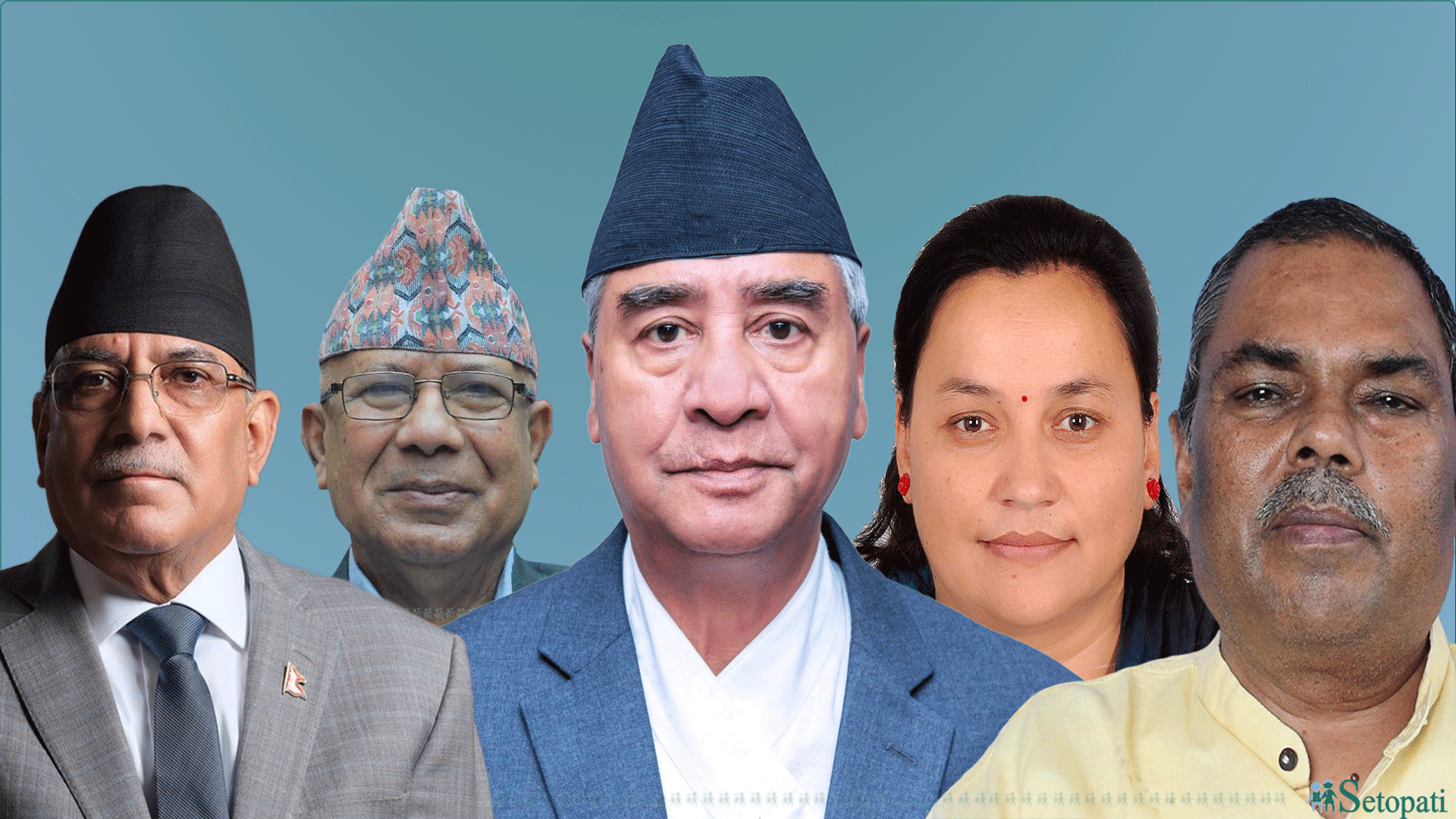The task force formed by the ruling coalition for sharing of seats in the upcoming elections is set to submit its report by Tuesday night.
Top leaders of the coalition will hold a meeting on Wednesday to discuss about the undecided constituencies and finalize the sharing of seats after the report is submitted Tuesday, according to a member of the task force.
Nepali Congress (NC) demanded candidacy in 100 out of 165 House of Representatives (HoR) seats to be elected through the first-past-the-post electoral system in the task force. CPN (Maoist Center) similarly staked claims for 60 seats, CPN (Unified Socialist) 40, Janata Samajwadi Party (JSP) 32 and Rastriya Janamorcha two.
The task force then sat with the top leaders after it failed to reach conclusion. Maoist Chairman Pushpa Kamal Dahal then proposed with NC President and Prime Minister Sher Bahadur Deuba that one seat should be allotted for Janamorcha and NC should get half of the remaining 164 seats, and Maoist Center, Unified Socialist and JSP share the other half.
"Dahal had assured Deuba that he would convince Unified Socialist and JSP about sharing of the remaining 82 seats within the three parties," another member of the task force told Setopati.
Deuba then told Dahal that NC should get 84 seats and another two seats should be allotted for Mahantha Thakur and Rajendra Mahato of Loktantrik Samajwadi Party (LSP), according to the task force member.
The task force could not decide about sharing of seats with Unified Socialist and JSP demanding more seats. Unified Socialist has demanded 40 seats but has been saying that it will not go below 26 while JSP, which has demanded 32, has set the bottom mark of 25.
Unified Socialist Chairman Madhav Kumar Nepal has been saying that NC should be more flexible to accommodate other parties and should not get more than 70. JSP Chairman Upendra Yadav, on the other hand, has been arguing that it will win 9-10 seats on its own and there would be no meaning of forging an electoral alliance if it gets to field candidates in only around 15 seats pointing that contesting in fewer seats may result in rebellion inside the party and also cost the party proportional representation votes.
The task force member said that the coalition will decide around the numbers proposed by Deuba and Dahal, and analysis will be done on individual constituencies on the basis of the relative strength of the coalition parties.
Setopati recently did a story on what would be legitimate claim of the coalition partners in sharing of House of Representatives (HoR) seats on the basis of the votes received in the recent local election and the last general election.
NC received 34.2 percent of the total votes, Maoist Center 13 percent, Janata Samajwadi Party (JSP) 5, Unified Socialist 3.66 and Rastriya Janamorcha 0.35 percent if we take the votes received by their respective candidates for ward chair across the country in the recent local election.
The votes secured by the coalition partners in this way was 56.2 percent of the total votes cast in the local election. If we take this 56.2 percent as 100 percent, NC received 60.8 percent of the total votes secured by the ruling coalition, Maoist Center 23.1 percent, JSP 8.9, Unified Socialist 6.5 and Rastriya Janamorcha 0.62 percent.
NC, in this way, can stake claim for candidacy in 100 of the total 165 HoR constituencies. Similarly, Maoist Center would get candidates in 38 seats, JSP 15, Unified Socialist 11 and Rastriya Janamorcha one.
We then looked at the votes secured by the parties in the last general election in 2017 in the proportional representation (PR) electoral system. Unified Socialist was part of UML then.
There has been very little change in the votes secured by the parties in the coalition in the general election in 2017 and the recent local election. NC’s vote increased by around one percentage point in the recent local election while that of Maoist Center has fallen by less than a percentage point. JSP’s has increased by a smaller proportion than that while Rastriya Janamorcha has also fallen negligibly. It would, therefore, be logical to assume that Unified Socialist would have received similar proportion of the votes it received in the recent local election had it contested in the general election in 2017.
NC received 33.2 percent of the total votes, Maoist Center 13.77 percent, the then Federal Socialist Forum Nepal (largely JSP now) 4.93, and Rastriya Janamorcha 0.70 percent in 2017. The votes secured by the coalition partners in this way was 56.3 percent of the total votes cast in the federal election in 2017 if we assume that Unified Socialist would have received 3.66 percent like it did in the recent local election.
If we take this 56.3 percent as 100 percent, NC received 59 percent of the total votes secured by the ruling coalition, Maoist Center 24.5 percent, JSP 8.8, Unified Socialist 6.5 and Rastriya Janamorcha 1.2 percent.
NC, in this way, can stake claim for candidacy in 97 of the total 165 HoR constituencies. Similarly, Maoist Center would get candidates in 40 seats, JSP 15, Unified Socialist 11 and Rastriya Janamorcha two.
There is not much difference in the claims for HoR seats on the basis of votes received in the general election in 2017 and the recent local election.
Our analysis showed that the parties in this way will agree on sharing of seats around the votes they received in the last two elections.

